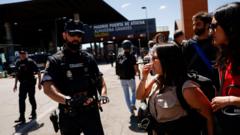A large-scale power outage struck significant portions of Spain and Portugal on Monday, resulting in widespread chaos and disruption across both nations. Millions found themselves without electricity as essential services, including internet and mobile networks, faced significant interruptions. In Spain, public transport systems ground to a halt, with numerous train cancellations and evacuations occurring in affected regions. Traffic lights malfunctioned, causing severe delays at airports as well.
Shops, homes, and restaurants were plunged into darkness, with some individuals trapped in elevators as the electricity network announced that restoring power could take several hours. By mid-afternoon, the cause of the outage remained largely unknown, although Portugal's Prime Minister Luis Montenegro indicated there was "no indication" of a cyberattack.
The blackout began around midday (13:00 BST), quickly escalating as more residents became aware of the magnitude of the situation. Authorities urged individuals in Madrid to remain where they were, avoid driving, and refrain from calling emergency services unless absolutely necessary. Reports indicated that power restoration could take up to ten hours in Spain, while Portugal's REN suggested full recovery might extend over the course of a week.
As public order became essential, police were deployed to manage the impacts of the outage on public transport within Madrid. Cash machines ran out of service due to failed card payments, and many petrol stations ceased operations altogether. Some hospitals began implementing emergency protocols, suspending routine services in response to the crisis.
After several hours without power, residents in various regions started reporting that electricity was gradually returning, specifically in the north, south, and western areas of the Iberian Peninsula. Spain's grid operator confirmed ongoing restoration efforts.
In response to public panic, the President of the European Council Antonio Costa assured that there were inconclusive findings of a cyberattack. As chaos continued, the mayor of Madrid, José Luis Martínez-Almeida, urged individuals to limit movement within the city. He emphasized the necessity of keeping roads clear and noted that emergency services were overwhelmed, redirecting citizens to police and fire stations if urgent assistance was needed.
Additionally, the sudden blackout shutdown the country's nuclear power facilities, with the Spanish oil company Moeve halting its refinery operations, further amplifying the chaos. Flights faced disruptions both in Lisbon and Madrid, causing cancellations and delays. EasyJet advised travelers to stay updated with local guidance as the situation remained fluid.
Affected businesses struggled to adapt, with IKEA branches resorting to backup generators and restricting customer access. The Madrid Open Tennis event scheduled for that day was canceled as a direct result of ongoing disruptions. Other regions, including Andorra and parts of France, also experienced fallout from the outage, although the Balearic and Canary Islands remained unaffected.




















